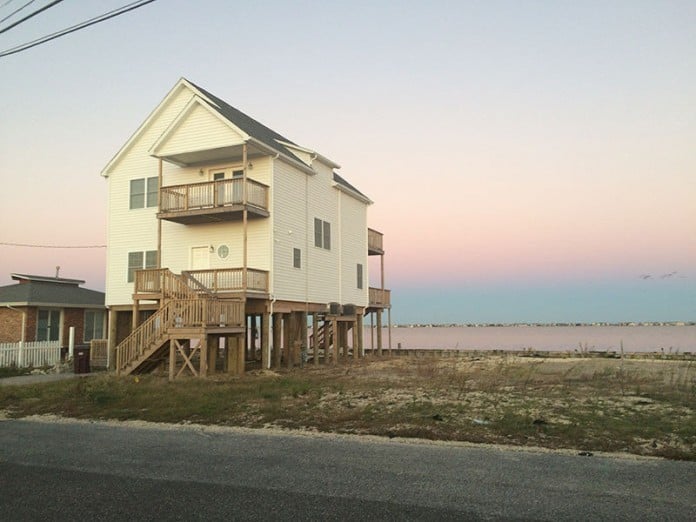
OCEAN COUNTY – Having seen Superstorm Sandy damage and already facing the expensive tasks of raising their homes to required heights, homeowners would then be reassessed, in what officials said is an unfair situation that amounts to penalizing them for complying with standards.
“Sandy is the gift that keeps on giving,” said Berkeley Township Mayor Carmen Amato, hoping the state will craft legislation to offer a tax abatement to those impacted.
The space created underneath a home after a home is raised to new flood elevation heights is seen as a taxable property value and becomes part of a new tax assessment for the homeowner, Amato said. The homeowner faces additional value assessment if they’ve enclosed this area with a cement foundation for example.
“They will be taxed on this, but they didn’t ask for this,” Amato said.
He and the Berkeley Council are hoping to see a lessened impact on these homeowners, similar to legislation enacted in New York, where this added property value wouldn’t take hold until five more years down the line.
“At the same time Sandy hit us, FEMA came out with their new flood maps and then after going through the information we have several homeowners who are forced to raise their home because of the new flood maps. Essentially if they don’t raise their home, they can get stuck with outrageous flood insurance bills,” said Amato. “So here is FEMA making these homeowners raise their homes, so they have to pay, but what it’s doing is now that their home is being raised its creating additional taxable space.”
The Berkeley mayor said he sought the advice of township department heads but also the taxpayers’ association to try and figure out what, if anything, could be done.
“I had a long conversation with our tax attorney and with our assessor and with the Berkeley Township Taxpayer Association, and found that other states in order to address this do a short-term abatement, so that when these homes are raised because of new flood elevations that the current assessment on the home will stay and last for about five years,” Amato said.
However, “right now in New Jersey there is no legislative mechanism to do this,” he added. He asked council to approve a resolution that is “essentially asking the legislature to come up with a tax abatement process for those affected homeowners by Sandy who were essentially forced to raise their home, and give them a little bit of tax abatement for up to five years. So at least they can plan.”
Berkeley resident Sam Cammarato said he is concerned that the flood elevation maps are still subject to change, adding to the unfairness of the situation: “We still don’t know what is going to happen with these flood maps. FEMA could come in and say well you elevated it, but guess what, it’s not enough. That is a possibility.”
The issue is one faced by Sandy-impacted properties and those near water.
“To those of us who are still living with it everyday, and those of use who are still trying to get back into their homes, It’s like it’s happened yesterday,” he said. “We had to contend with not just the storm, but insurance companies, FEMA, unscrupulous contractors…but after all that and contending with all that, we now have to contend with the tax assessor.”
Cammarato said many who are raising their homes are doing so not because they want to but because they are essentially being forced to by ever-changing flood insurance mandates.
“We were forced by law to raise our homes, creating tax-assessed space underneath our homes that we didn’t want in the first place,” he said. “And yet the tax assessor is going to say you are going to be assessed higher for that space.”
In many cases these homeowners are not even living in their homes, as they are significantly damaged and awaiting elevation, he said.
The issue is not one only faced by Berkeley residents, as residents across Sandy-impacted areas, and those coming into new FEMA flood map recommendations, find themselves candidates for home elevation projects.
For example, in Toms River, officials have issued 1,156 permits and completed 781 for home elevation this year. There were also 250 residential elevators installed since the storm, officials said.
In Brick, the number of home elevations was 1,129 elevation permits with 707 completed as of the fourth anniversary of the storm in October.
Amato is hoping local legislators can craft and approve legislation to provide the abatement.
For Berkeley, “we will not be losing any ratables because whatever the house value is today will continue to be the house value. It’s just that after five years — if the law is adopted — then after 5 years that additional space that the homeowner didn’t want would then be put on the books,” said Amato. “So we are just trying to help our Sandy-impacted homeowners and maritime homeowners.”






